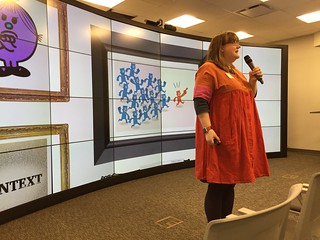 The keynote speaker at the Upstate NY SLA Chapter spring conference was Rochelle Mazar, who spoke on leadership.
The keynote speaker at the Upstate NY SLA Chapter spring conference was Rochelle Mazar, who spoke on leadership.
We
change because we want to. It can be slow. As leaders, we cannot
force people to change. However, we need to think about the context in which our staff are functioning. We can change the context. Culture and
context tell us what is expected. We can spend a lot of time looking at
context. Mazar focused on “us” (leaders) as context.
What
is leadership? A leader has followers. A leader without followers is
just going for a walk, rather than leading a parade. (See the image above.)
Why
are you a leader? Why is it you? Expertise, best at whatever,
competence, specialized knowledge? This is often who leaders are.
However, if the leaders knows it all, what is left for the team?
What
if your reframe leadership as guiding, making connections, empowering
people, advocating, having a big picture perspective, clearing
obstacles. When we take on this role, we make room for staff, their
ideas and the tasks that they own.
Leader to staff: “How do YOU think we can solve this?”
Leaders
need to acknowledge their own mistakes. Mistakes make the leader seem
human. Embracing mistakes means that your are embracing
experimentation.
Leases automatically have
power. How do you want to distribute it? Do you need all of the power
in every moment? Sharing power demonstrations trust in your staff.
How
do you let staff soar? Have high expectations of staff. When you do
that, you are showing respect for the skills that staff have. Focus on
outcomes and not process. Use their expertise. Remember that all staff
have something important to offer.
Question:
How can we handle when staff leave/retire? Have the retiring staff
member document what they have been doing. Then make sure you have a
good onboarding for new staff. Someone noted that millennials may not
stay long in a position (3-5 years). Have a plan for how you will
handle that turnover. Also remember that new staff are bringing skills
with them that you may not have had before.
Question:
How can you help staff get past negatives or institutional baggage? As
leaders, we need to be honest and face issues. We need to lean into it
and learn how we can do things differently in the future. What about issues
at a high level that we cannot control? We need to help people cope.
You may need to over share information, so people know what is
happening. Over sharing is not dropping the leadership hat. Good
leaders are willing to explain the real circumstances.
Question: How can consultants use this? Recognize that when you walk into a situation, you have all/much of the power.
Question:
How do you share ideas with a leader who doesn’t want to hear them?
Solutions proposed by the group included sharing info with the leader
in a way that leaves the person in power.
Question: How do you get staff to empower each other? Find ways of getting staff to share ideas with each other. Experiment.
No comments:
Post a Comment